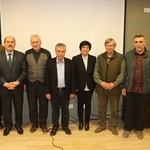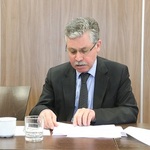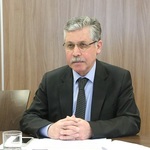Photos by ForestPress
Interview with Mr. Ahmet Kara, Vice President of the Turkish Chamber of Forest Engineering
As we wrote earlier, the current meeting of the leaders of the Council of European Foresters took place on March 5-6, 2020 in Budapest. The interview was conducted on this occasion.

- Why did you choose a career in forestry?
-To be honest, I did not know much about forestry when choosing this profession. I chose it completely with the advice of friends. I chose the Forest Engineering because it is an area where there is an opportunity for employment and employment in the public sector. As a result, I am a Forest Engineer for 30 years. I'm glad I chose this profession. I like my job.
- Where did you graduate from university?
- I studied at Karadeniz Technical University Faculty of Forestry http://www.ktu.edu.tr/orman. This university is located in Trobzon province, which is the Black Sea coastal city. I graduated from the Forest Engineering Department in 1989. In those years there were two Faculty of Forestry in our country.

- Where and in what job did you start your career?
- I started my profession at the end of 1991 in Şebinkarahisar District of Giresun Province, which is also a Black Sea coastal city https://giresunobm.ogm.gov.tr/sebinkarahisaroim/Sayfalar/default.aspx. I won the written oral exams opened by the General Directorate of Forestry. My workplace was determined by drawing lots.
- What are the most important tasks and objectives for Turkish foresters?
- The most important task of Turkey foresters; to protect forests and forest resources, to develop with a close approach to nature, to increase forest area and wealth, to operate and manage in a sustainable ecosystem integrity and to provide multidimensional benefits to the society.
- What improvements would you like to make in the profession?
- We would like to increase the respectability of Forest Engineering in the society and increase the recognition of the General Directorate of Forestry to the highest levels. This profession group, which manages 28% of the country's area, works very devotedly and does very well in the name of forestry. However, this profession group is very modest in transferring itself and the work it does to the society and it is inadequate in publicity. The workload of our colleagues working in the public sector is very high, our aim is to reduce this burden.
- What assistance can the Chamber provide to these goals?
- If I give some information about the OMO, I can say tha The Chamber of Forest Engineer of Turkey (OMO) is a non-governmental organization established in 1954 to represents its members. According to the related Law, the “Chamber of Forest Engineers “is the legal representative of three different professional groups namely;
Forest Engineers,
Forest Industrial Engineers,
Woodworking Industrial Engineers”
At national level, “Chamber of Forest Engineers” is an affiliated chamber to the “Union of Chamber of Turkish Engineers and Architects
According to the Turkish Constitution it has “public corporate entity” and “public institute nature”.
Currently it has approximately 20 thousand active members.
At European Level, this Union is a member of “FEANI-European Federation of National Engineering Associations- https://www.feani.org/ “.
FEANI is a founding member of the World Federation of Engineering Organizations (WFEO) http://www.wfeo.org/ and collaborates with many other organizations dealing with engineering and technology issues and engineering education.
FEANI is officially recognized by the European Commission as representing the engineering profession in Europe.
The federation also has consultative status with UNESCO, UNIDO and the Council of Europe.
The easing of the workload of our colleagues working in the public sector is among our most important goals. We are working to increase the share of our colleagues working in the private sector from the forestry sector, and we have targets in carrying out these works further and increasing the recognition of the profession.
- Under what conditions do you distinguish between the three sections of the Chamber?
- As you said, there are three professional disciplines under the umbrella of OMO. These are Forest Engineering, Forest Industrial Engineering and Woodworking Industrial Engineering. I am in the "Forest Engineer" professional group.
- Are there institutional or organizational members or just individuals?
- Only individuals named Forest Engineer, Forest Industry Engineer and Woodworking Industrial Engineer can become members of OMO. Institutions or other NGOs cannot be members.

- You said in Budapest: they are working hard for new members. How? What do we mean by that?
- There is no compelling provision in our law for our colleagues working in public or outside the forestry sector to become members of OMO. It totally depends on the consent of the people. Our colleagues in this situation are reluctant to become a member of OMO. For this reason, we need to do serious work for these friends to become members. However, a colleague who wants to do business in the forestry sector in the private sector cannot work without being a member of OMO and fulfilling some obligations. Because the "Professional Law" approved by Parliament brought such an obligation. http://www.gonder.org.tr/?p=7257
- What does it mean in practice to maintain contacts with government agencies?
- In accordance with the "Professional Law", we have to work with both public and private sectors. For this reason, we establish close relations with public institutions, in particular with the Ministry of Agriculture and Forestry and affiliated General Directorate of Forestry. In cooperation with many fields, we are producing services to these institutions with our professional members. The related public institutions of forestry have their jobs done by forestry offices and companies by tender. As OMO, we provide coordination in these processes.
- What is their answer to the question of prospective new members: Why is chamber membership good?.
- OMO is primarily a non-governmental organization. Therefore, all of our colleagues must be members in order to protect our country's forest and forest resources. In this respect, volunteering is essential to become a Member.
On the other hand, We work with the line of the Law No. 5531 on “Forest Engineering, Forest Industry Engineering and Woodworking Industrial Engineering”,
- How much is the chamber membership fee?
- About 1 USD per month.
- Why only the public sector delegates members to management?
- Yeah, that's a good question. Actually, I questioned this situation a lot. OMO has always been administered by public employees until the Occupational Law has been implemented. Because, an estimated 90% of those who graduated from the Forestry Faculties before 2000s were working in public. After 2000, the number of faculties increased, graduates increased.
Today, the number of people working in public institutions is less than those working in the private sector. However, those working in public institutions are more organized. It is easier for them to move together. On the other hand, it is difficult for the employees in the private sector to act jointly. In addition, the problem of competition among themselves is effective. As a result, OMO management mostly consists of Members working in public institutions.Of course, the private sector does not exist at all. In our Branch Managements, which are small provincial units, we also have members from the private sector.-
- What are the most important experiences of FAO projects? For example, the African Green Wall?
- OMO has close cooperation with FAO. We have been working by signing some Letter of Agreements with FAO. Some of them can be list as follows.
March 2019- LoA for Provision of training on various subjects for the employees of forest enterprises of the State Agency for Environmental Protection and Forestry of Kyrgyz Republic.
September 2019- LoA For provision of “Development of the draft of the full-fledged project document on ‘Restoration of Degraded Forests and Other Lands for financing under FTFP”
October 2019- LoA-For provision of “Biophysical Data Assessment in support of Monitoring of the Restoration Activities under the Great Green Wall Initiative
December 2019- LoA for provision of Technical Guideline on sustainable management of NWFPs and the Status Reports on specific selected products
For your question on Great Green Wall, actually, as you know, the FAO Regional Office for Europe-REU and Central Asia based in Budapest. http://www.fao.org/europe/fao-in-europe/en/
And the FAO Subregional Office for Central Asia -FAOSEC-which is a part of REU is located in Ankara, Turkey. http://www.fao.org/europe/central-asia/en/
Establishment of the office in 2006 enhanced FAO’s ability to respond to the priority needs of the countries in the subregion – Azerbaijan, Kazakhstan, Kyrgyzstan, Tajikistan, Turkey, Turkmenistan and Uzbekistan.
So we are working mainly with these countries. As you may already know, these countries are the members of Turkic Council https://www.turkkon.org/en and Hungary has `observer state statu` in this organisation/ https://www.turkkon.org/en/gozlemci-ulkeler
This FAOSEC Office has also rigt to work in African Countries that’s why we are dealing with the Great Green Wall Project in Africa.
- What information do you expect from CEF?
- OMO attaches great importance to cooperation with CEF.
Our expectation from CEF is to further strengthen its institutional structure.
Actually OMO works internationally through its network and we are ready to share our experience with CEF. Currently OMO has Letter of Cooperation with the following NGOs.
1
Albania
ALBAFOREST CENTER
www.albaforest.com
2
Azerbaijna
Natural Wealth and Ecology Workers Trade Union RepublicCommittee
http://ahik.org
3
Bosnia and Herzegovina
The Association of Hunting Organizations in Bosnia and Herzegovina
http://www.slobih.ba/
4
Bosnia and Herzegovina
The Independent Trade Union of Forestry, Wood Processing and Paper of Bosnia and Herzegovina-
http://ssspdp.ba/
5
Bosnia and Herzegovina
Forestry Association of Federation of Bosnia and Herzegovina
http://usitfbih.ba/
6
Bosnia and Herzegovina
Beekepers Union of Sarajevo
7
France
The International Association for Mediterranean Forests (AIFM)
http://aifm.org/en
8
Kyrgysztan
KYRGYZ ASSOCIATION OF FOREST AND LAND USERS
http://www.landuse-association.kg/
9
Hungary
The Trade Union of Forestry and Wood Industry Workers
http://efdsz.hu/
10
Romania
SILVA TRADE UNION FEDERATION
https://federatiasilva.ro/
11
Romania
The “Forest Progress” Society
http://progresulsilvic.ro/




